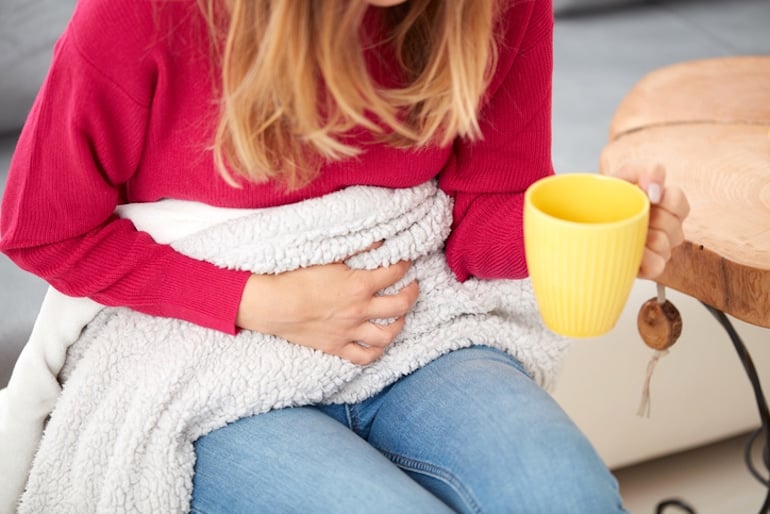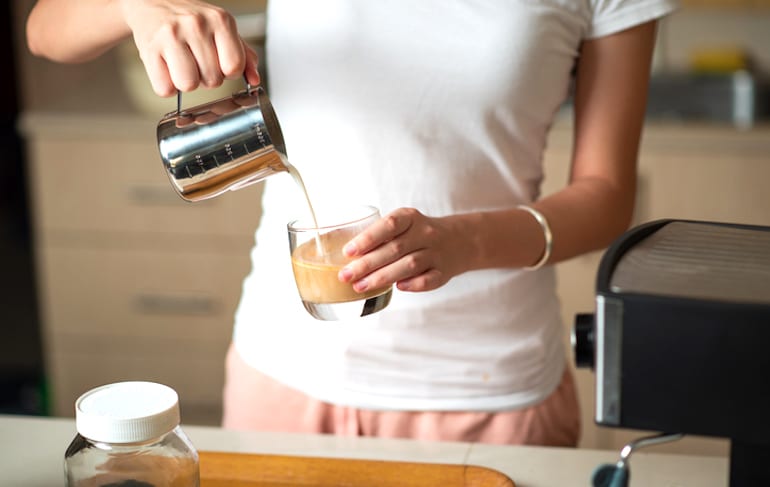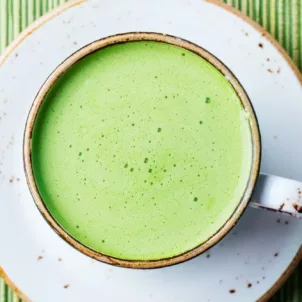THE WELLNEST • Food • Healthy Eating
Does Coffee Make You Bloated? Here’s an RD’s Take
By Chelsey Amer, MS, RDN, CDN •
April 5, 2021
Medically Reviewed By
Gaby Vaca-Flores, RDN, CLE
Registered Dietitian Nutritionist
Chelsey Amer, MS, RDN, CDN, answers a common question amongst java lovers: Does coffee cause bloating?
If you’re like me, you wake up, saunter into the kitchen and get your coffee started ASAP. Whether it’s brewed coffee, a single-serve cup, cold brew, French press, or any of the other countless ways to get your caffeine fix these days, coffee is a morning staple for many of us.
Which leads us to the million dollar question…


Does coffee make you bloated throughout the day?
Simply put, yes and no. Coffee is naturally a diuretic, meaning it flushes extra water out of your body. For many people, this means that coffee can actually reduce both bloating and extra water weight. However, there are several reasons why coffee can still cause bloating.
4 Reasons Why Coffee Can Cause Bloating
If coffee makes you gassy, bloated, or otherwise takes a toll on your digestive system, here’s a closer look at why that may happen.1. Coffee Excites the Digestive Tract
Has your morning cup of coffee ever sent you running to the nearest restroom? That’s because coffee stimulates peristalsis, a series of contractions of the muscles in your colon. So coffee doesn’t just jolt your brain awake in the morning—it can also over-excite your digestive tract. For that reason, it can potentially lead to bloating and uncomfortable spasms.2. Coffee Is Acidic
If you have a sensitive stomach, you may be more susceptible to coffee’s high acidity. Similar to tomatoes, citrus, and chocolate, coffee can irritate your digestive tract, with bloating as one sign of irritation. Studies find that coffee stimulates the secretion of gastrin. Gastrin is a hormone that’s responsible for gastric motility and the secretion of acid in the stomach to support digestion. Plus, if you drink coffee on an empty stomach, you may be more susceptible to irritation and bloating. Keep a food journal to record:- when you drink coffee
- what you put in your coffee
- any symptoms you feel
3. You Add Cream or Milk to Your Coffee
Experts estimate that around 65 percent of people worldwide have some degree of lactose intolerance post-infancy. Lactose is the milk sugar found in dairy products, including yogurt, cream, ice cream, and cheese. Your body naturally produces lactase, an enzyme that breaks down lactose. However, the amount of enzyme produced declines as you age.nIf you have difficulty digesting lactose, adding milk or cream to your cup of coffee can lead to uncomfortable bloating. To see if cream or milk is the culprit causing daily bloat, try sipping your coffee without dairy additives. Plus, you can also opt for a plant-based milk alternative. Additionally, you can take digestive enzymes such as Flatter Me to help break down lactose. Flatter Me contains lactase, thus improving digestion and minimizing side effects.
4. You Use Artificial Sweeteners
If you add a couple of light pink, blue, or yellow packets to your coffee, you may experience even more bloating and gas. In addition, a laxative effect is also possible. Your body doesn’t easily recognize most artificial sweeteners. In fact, many artificial sweeteners aren’t digested in your body and can cause irritation, such as bloating. Plus, have you ever wondered why coffee makes you gassy? Bacteria in your intestines feed on these artificial sweeteners, ferment them, and can also lead to excessive gas production. Moreover, prolonged and heavy use of artificial sweeteners can disrupt your gut microbiome, leading to unpleasant digestive symptoms. You may wish to audit your artificial sweetener intake by keeping a food diary. Note that artificial sweeteners can sneak into other beverages you consume throughout the day, too.The bottom line
The bloat you experience from coffee is usually temporary, but it can still be bothersome. If your pants feel uncomfortably tight post-java, you may want to rethink your coffee routine. To learn once and for all if coffee makes you bloated, I suggest keeping a food diary. It’s a great tool to help you notice if there are any associations between your coffee drinking and uncomfortable digestive symptoms. From there, if you’re still unsure what’s causing your bloat, work with a dietitian. They can make personalized recommendations based on your symptoms and dietary history to beat digestive discomfort for the long haul.More like this









